Smart Hotel Technology: Transforming the Hospitality Industry
Nov 23, 2025
 Mika Takahashi
Mika TakahashiPopular Categories
Hotel Technology & InnovationHotel Operations OptimizationDigital MarketingIndustry TrendsRevenue ManagementHospitality Industry
Popular Categories
Trending Post

Hotel Walk Letter Template: Professional Guest Communication

Online Travel Agents: What They Are and How They Work
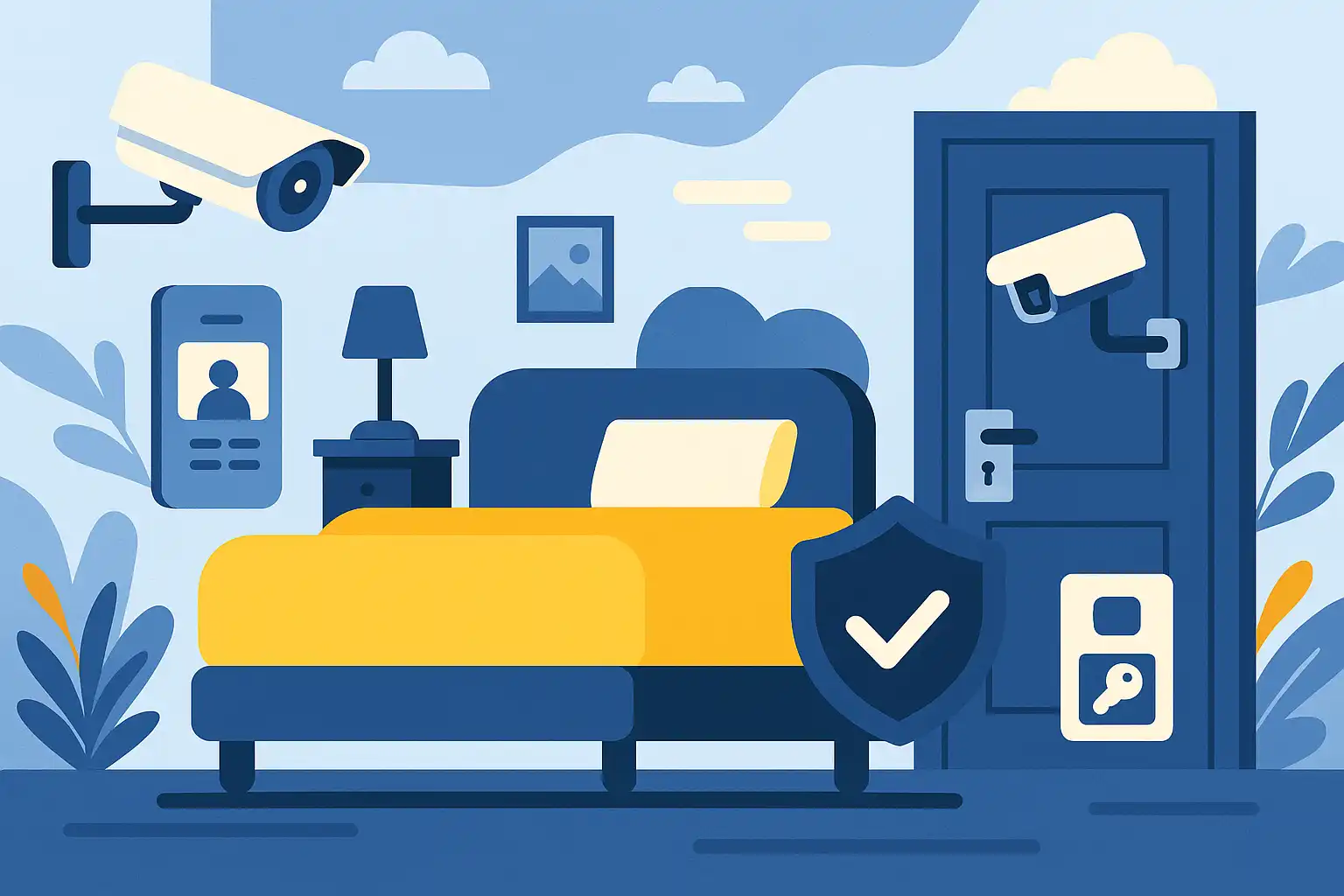
Hotel Security Systems: Modern Protection Solutions

Hotel Advertising: Complete Guide to Boost Bookings and Revenue
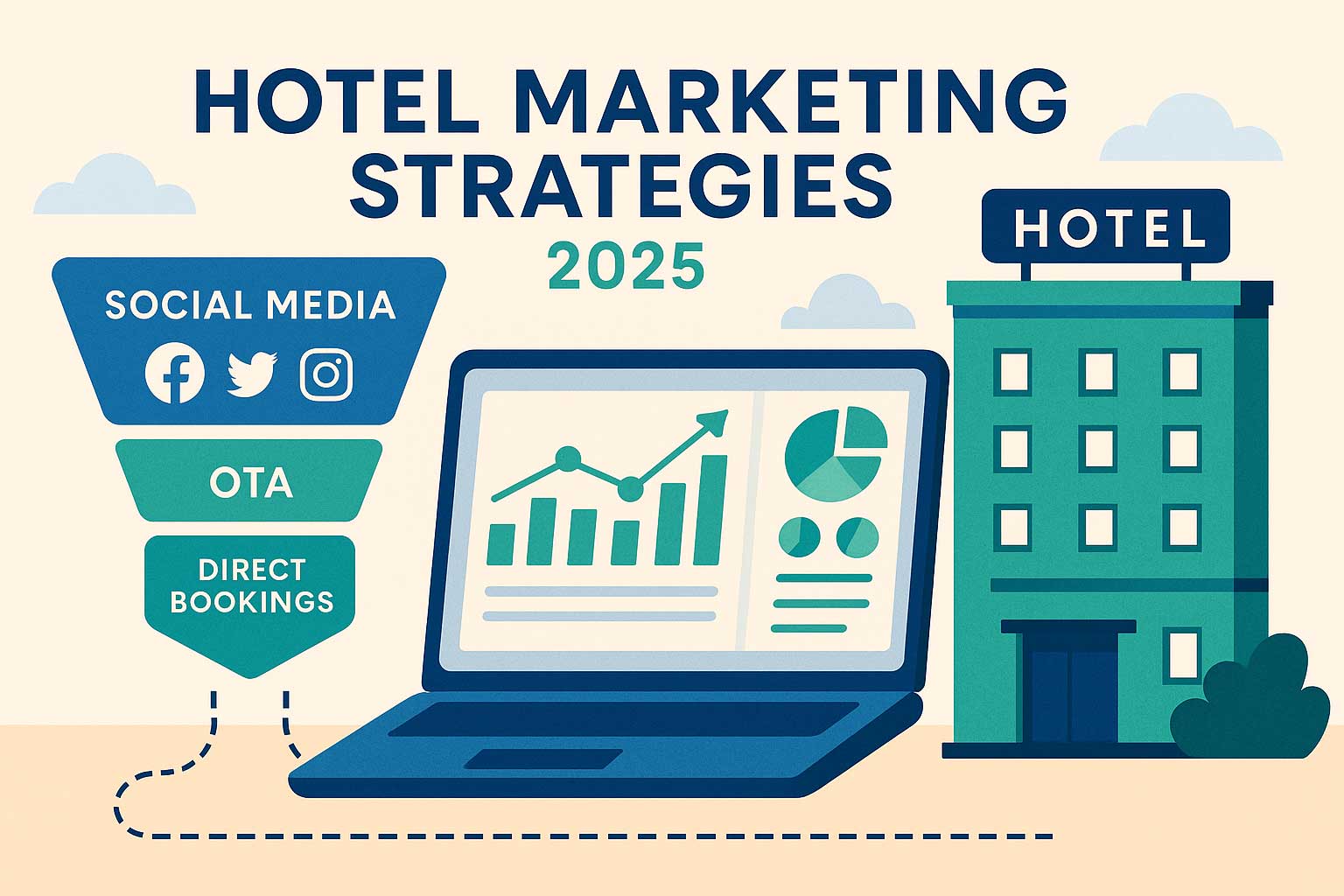
25 Hotel Marketing Strategy Ideas for 2025: Complete Guide

AI Reservation Agent: Revolutionizing Hotel Booking and Guest Experience

PMS Communication: Streamlining Property Management Through Effective Guest Messaging
Table of contents
The hospitality industry is at a turning point where traditional service meets practical innovation. Smart hotel technology has shifted from being a luxury perk to a must-have tool, changing how hotels operate and how guests experience their stays. With 86% of hotel operators already using in-room technology and 74% planning to roll out digital apps, this isn’t a passing trend—it’s the new baseline for hospitality today.
Smart hotels aren’t just about automating tasks; they’re about anticipating guest needs and making operations smoother. By connecting systems, using artificial intelligence, and leveraging mobile apps, hotels create a seamless experience that benefits both guests and staff. This smart hospitality ecosystem improves guest satisfaction while helping hotels run more efficiently.
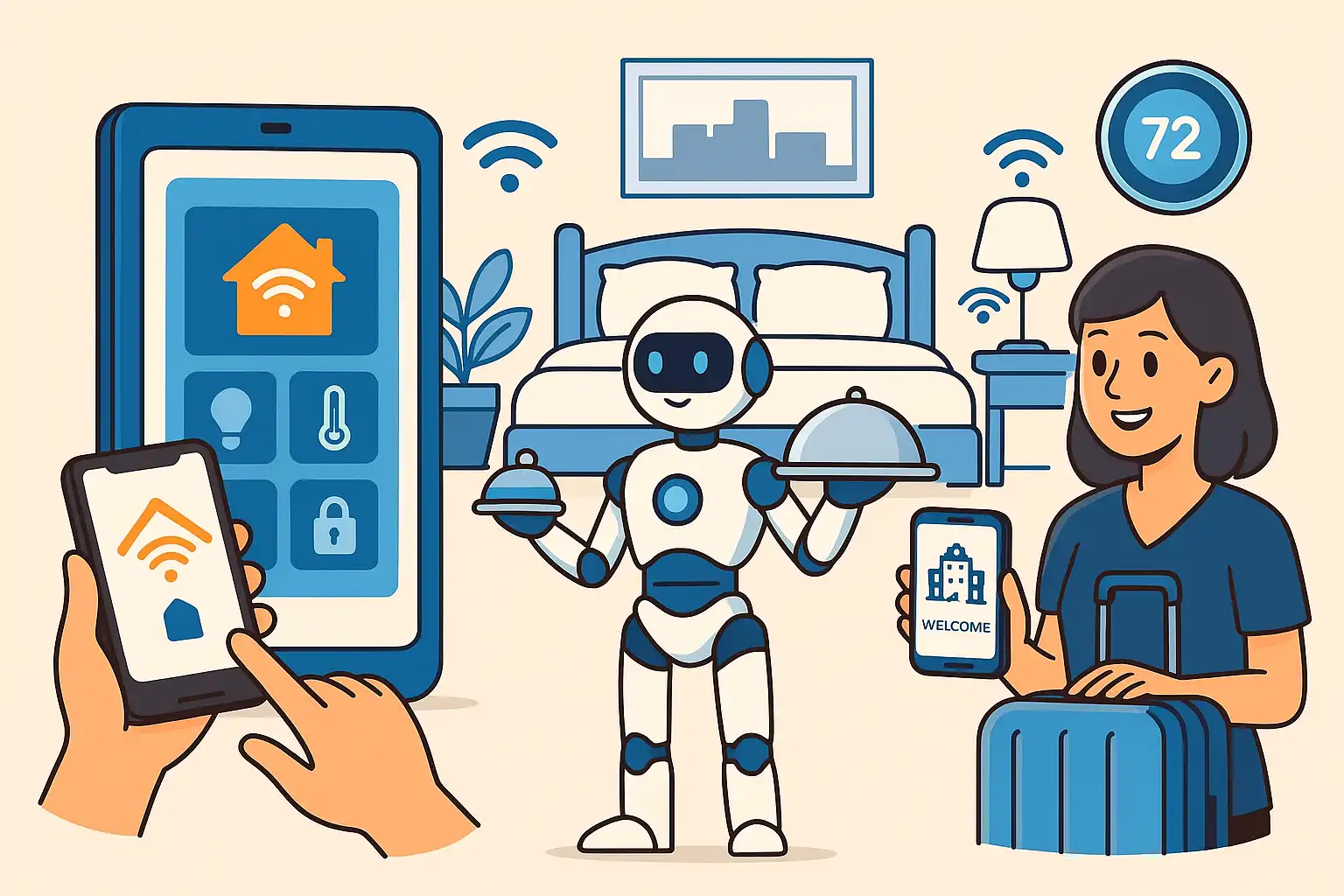
What is Smart Hotel Technology?
At its core, smart hotel technology means using internet of things (IoT) devices, AI, mobile apps, and automation to improve guest experiences and streamline hotel operations. Unlike traditional hotels that rely on manual processes, smart technology links devices like lighting, air conditioning, smart TVs, and door locks through a central property management system (PMS). This lets guests easily control room settings via voice commands, apps, or sensors that adjust based on occupancy and preferences.
One clear example is the move from key cards to digital room keys. Guests can now use their smartphones to unlock doors, skipping the front desk and reducing physical contact—a shift that aligns with growing guest expectations for convenience and safety.
Here’s the kicker: these technologies aren’t just guest-facing. Behind the scenes, they help hotels reduce operational costs and improve service quality. For instance, occupancy sensors can automatically turn off lights and adjust air conditioning when rooms are empty, saving energy without compromising comfort.
Core Technologies Powering Smart Hotels
Internet of Things (IoT) Devices
IoT is the backbone of smart hotels. Sensors throughout guest rooms detect when someone enters or leaves, triggering energy-saving actions like adjusting heating or lighting. Smart thermostats learn guest temperature preferences and fine-tune climate control automatically. Automated blinds respond to the time of day or guest commands, setting the mood or saving energy.
Smart beds with sleep tracking are another example. They monitor rest patterns and adjust temperature to help guests sleep better. On a larger scale, IoT sensors track energy and water use across the property, enabling predictive maintenance and helping hotel owners cut costs.
Artificial Intelligence and Machine Learning
AI personalizes the guest experience by analyzing booking history, in-room preferences, and behavior patterns. For example, when a returning guest checks in, AI can automatically set the room temperature and lighting to their liking and queue up their favorite entertainment on the smart TV.
Virtual assistants and hotel chatbots handle common guest requests—like ordering room service or asking about hotel amenities—24/7, freeing up staff for more complex tasks. AI also helps hotels forecast demand, optimize pricing, and plan maintenance, improving operational efficiency.
Mobile Applications and Digital Platforms
Mobile apps have become the hub for guest interaction. They let guests check in and out, choose rooms, and receive digital keys—all without waiting in line. In-app room service ordering connects guests directly to kitchen staff, making dining faster and more convenient.
Apps also offer concierge features powered by AI, suggesting local attractions based on guest preferences. For example, the Hilton Honors app lets guests stream their own content on in-room TVs and control entertainment settings, creating a home-away-from-home feel.
Voice-Activated Controls
Voice controls have made it easy for guests to manage room features hands-free. Devices like Alexa, Google Assistant, and Siri let guests adjust lighting, temperature, and music or ask about hotel services simply by speaking.
Multilingual support breaks down language barriers, and advanced voice recognition can personalize responses for different guests in shared rooms. The Westin Buffalo uses Alexa in rooms so guests can request housekeeping or make reservations with ease—a real convenience, especially for those juggling luggage or mobility challenges.
Smart Room Features and Experiences
Automated Check-in and Keyless Entry
Self-service kiosks speed up check-in, with 73% of guests preferring this option over traditional front desk lines. These kiosks handle room assignments and payments, freeing staff to focus on guest needs that require a personal touch.
Biometric systems like facial recognition offer seamless, secure access to rooms and common areas without keys or cards. This tech also keeps detailed access logs for security. Meanwhile, mobile key technology lets guests unlock doors with their phones, reducing lost key issues and enabling easy temporary access sharing.
Personalized Room Controls
Smart mirrors with interactive displays act as in-room command centers, offering TV controls, weather updates, fitness tracking, and concierge services. They can greet guests by name and show personalized messages.
Smart beds adjust firmness and temperature based on sleep tracking, while lighting and climate controls remember guest preferences from previous stays. Guests can manage these settings via voice commands or mobile apps without leaving their beds.
Enhanced Entertainment and Information
Smart TVs do more than play shows; they provide hotel info, local weather, and event updates. Guests can order services, book spa treatments, or request housekeeping directly through the TV interface.
Integration with personal streaming accounts means guests can enjoy Netflix, Spotify, or other services without complicated logins. AI-powered local recommendations suggest restaurants and attractions tailored to guest interests, and can even make reservations or arrange transportation.
Leading Smart Hotel Examples Worldwide
- Henn-na Hotel, Japan: Known as the world’s first robot-staffed hotel, it uses humanoid robots for check-in and AI scheduling for maintenance. This reduces operational costs while creating a unique guest experience.
- CitizenM Hotels: Fast check-in kiosks and app-controlled mood lighting make for a user-friendly stay. Guests control room settings and access hotel info via tablets, making the experience straightforward and enjoyable.
- YOTEL Singapore: Features self-service check-in kiosks, robotic luggage storage, and SmartBeds™ designed for small spaces. It shows how automation can maximize comfort in urban hotels.
- Hotel Milano Scala: A zero-emissions hotel using voice-controlled lighting and virtual concierge services to support sustainability without sacrificing convenience.
- Aloft Hotels: First major chain to introduce Siri voice control, allowing guests to adjust room features and request services by voice.
- The Westin Boston Seaport: Combines voice control with in-room tablets for lighting, temperature, entertainment, and hotel info access.
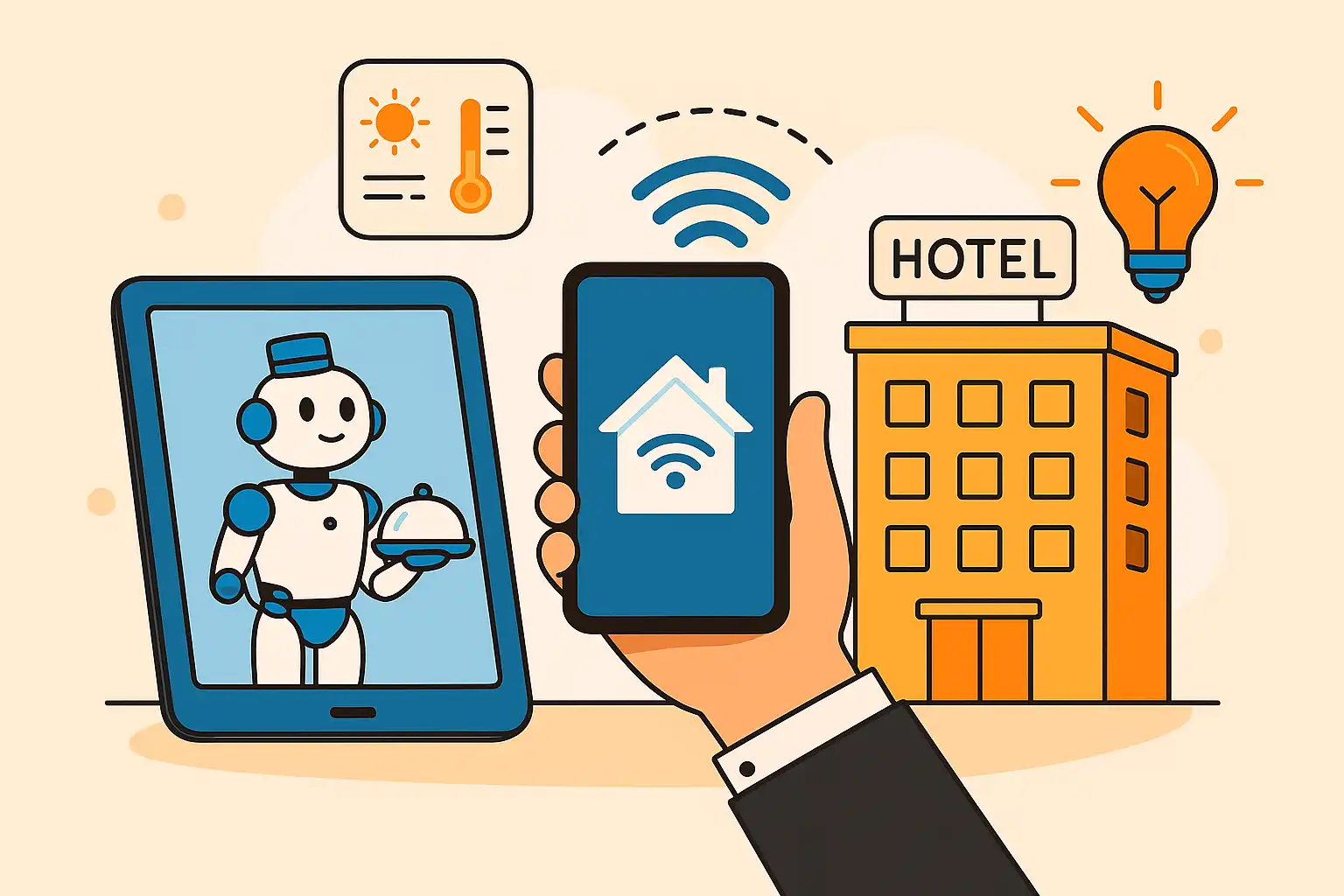
Benefits of Smart Hotel Technology
Advantages for Guests
Smart hotel technology gives guests control and convenience. They can check in remotely, unlock rooms with digital keys, and adjust room settings without staff assistance. This autonomy appeals especially to business travelers and tech-savvy guests who value efficiency.
Personalization makes stays more comfortable. Smart systems remember preferences for lighting, temperature, and entertainment, creating a familiar environment that encourages repeat visits.
Faster service and shorter wait times improve satisfaction. Mobile apps and automated systems ensure guests get prompt responses anytime, even when staff are busy.
Benefits for Hotel Operators
Smart technology boosts operational efficiency by automating routine tasks like check-in, key management, and service requests. This frees up staff for higher-value guest interactions.
It also helps reduce labor costs while maintaining service quality—important in a market with staffing shortages.
Data from smart systems gives hotel managers insights to optimize operations and pricing, improving profitability.
Finally, smart hotels stand out as innovative and tech-forward, attracting guests who expect modern conveniences and are willing to pay for them.
Sustainability and Energy Management
Smart sensors and energy-saving systems can cut hotel energy use by up to 30%. Occupancy sensors adjust heating, lighting, and ventilation when rooms are empty, reducing waste without sacrificing comfort.
Water management systems detect leaks early and monitor usage to promote conservation. Smart irrigation and laundry systems further reduce water consumption.
Hilton, for example, has cut water use by 43% since 2008 by adopting smart technologies across its properties.
Digital amenities reduce paper waste by replacing printed materials with electronic options like mobile directories and receipts, aligning with guests’ growing environmental concerns.
Implementation Challenges and Solutions
Integrating new technology with existing systems can be tricky, especially in older buildings. A phased approach starting with pilot rooms helps manage disruptions.
Data privacy and cybersecurity are critical. Hotels must protect guest data with strong encryption and regular security checks.
Staff training is essential for smooth adoption. Well-trained employees can assist guests and troubleshoot issues quickly.
Initial costs can be high, but long-term savings and improved guest satisfaction justify the investment.
Guest education is also important. Clear instructions and optional use ensure technology enhances rather than frustrates the stay.
Future Trends in Smart Hotel Technology
AI personalization will get smarter, learning guest habits and anticipating needs with greater accuracy.
Wearable tech integration will allow rooms to adjust based on health data, supporting wellness-focused travelers.
Robots will expand their roles to include room service delivery and housekeeping assistance.
Blockchain could secure transactions and loyalty programs, making guest data management safer and more seamless.
AR and VR will offer immersive experiences, like virtual tours and interactive local guides.
5G networks will support faster, more responsive smart hotel systems, enabling new high-bandwidth applications.
The smart hospitality market is projected to reach $49.9 billion by 2030, fueled by rising guest expectations and operational benefits.
Getting Started with Smart Hotel Technology
Start by assessing your current tech and guest feedback to prioritize investments.
Begin with high-impact, low-cost solutions like mobile apps, digital keys, or smart thermostats.
Train your staff thoroughly and involve them early to champion the change.
Collect guest feedback regularly to refine your systems.
Track ROI using guest satisfaction, efficiency, and revenue metrics to guide future investments.
Smart hotel technology isn’t just a nice-to-have anymore. It’s essential for meeting guest expectations, improving operations, and staying competitive. The journey requires planning and investment, but the payoff is a better guest experience, greater efficiency, and a stronger market position. Start today to keep pace with this evolving landscape.
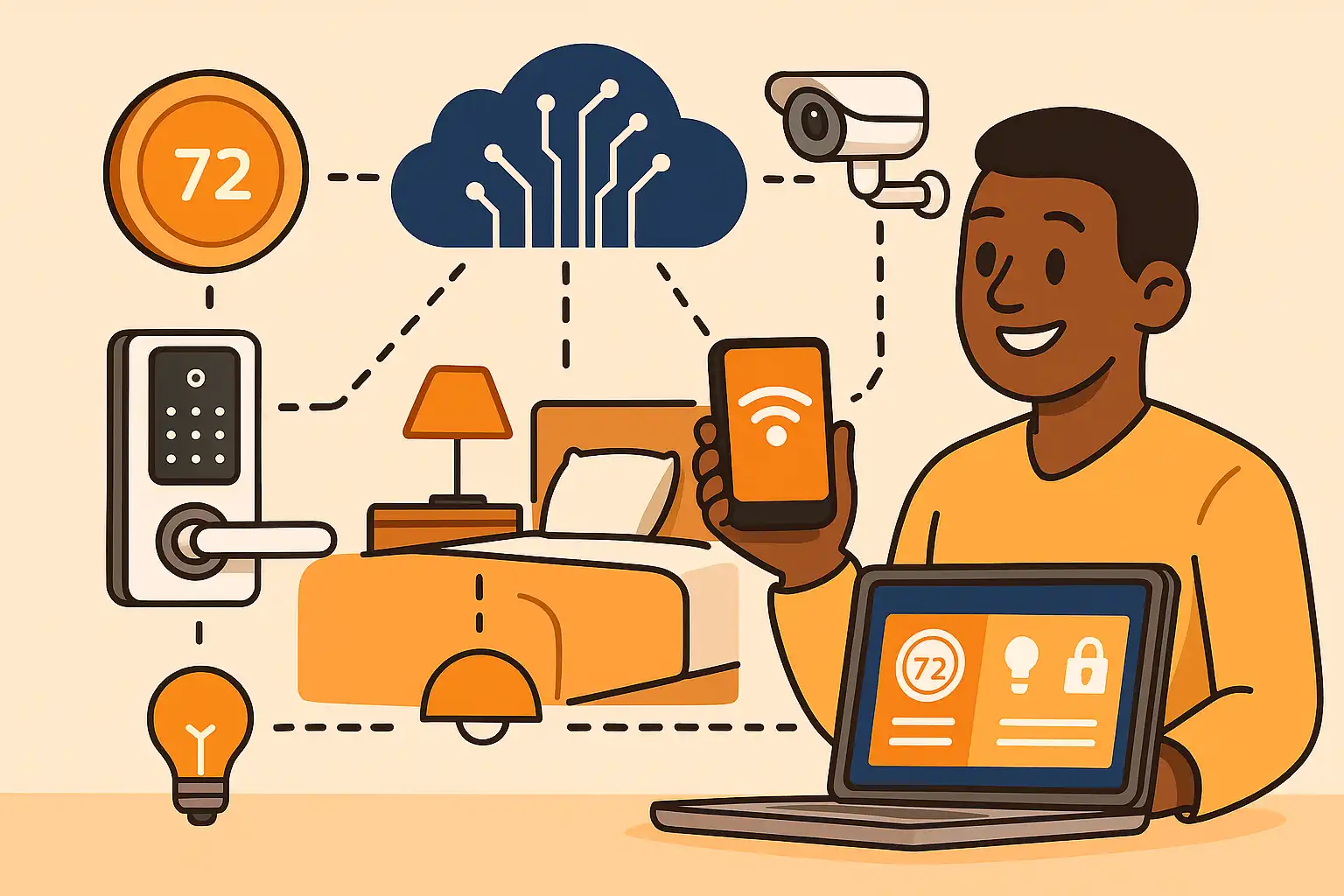
Pro Tip:
Pilot your smart technology rollout in a small section of your property first. This lets you fine-tune systems and train staff without disrupting the entire operation.
Myth vs Reality:
Myth: Smart hotel technology is only for luxury properties.
Reality: Smart tech scales to all hotel types. Even small hotels can benefit from mobile check-in and smart thermostats to save costs and improve guest satisfaction.
Key Takeaways
- Smart hotel technology connects devices and systems to personalize guest stays and streamline hotel operations.
- Core tech includes IoT sensors, AI, mobile apps, and voice controls.
- Benefits include improved guest convenience, operational efficiency, cost savings, and sustainability.
- Leading hotels worldwide showcase diverse smart tech applications, from robotic staff to voice-activated rooms.
- Challenges like integration, security, and training require thoughtful planning and phased implementation.
- Future trends point to deeper personalization, wearable integration, robotics, blockchain, and immersive tech.
- Start with small, impactful tech investments and build from there, measuring ROI and gathering feedback.
Embracing smart hotel technology today sets you up for success in tomorrow’s hospitality landscape. Let’s make your hotel smarter, more efficient, and more guest-friendly—one smart step at a time.
